Iranian Military Introduces Salary And Service Reforms
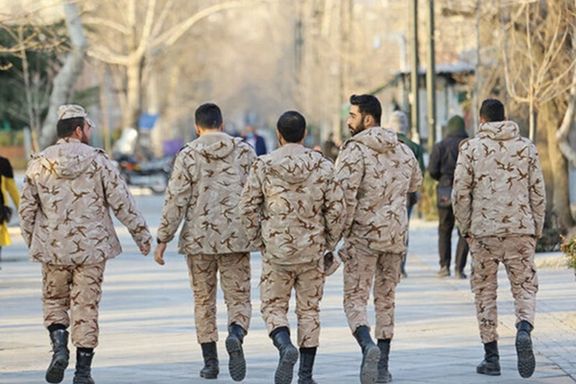
Iran has introduced a new salary structure for its soldiers, taking into account various factors such as the place of service, marital status, and the number of children.

Iran has introduced a new salary structure for its soldiers, taking into account various factors such as the place of service, marital status, and the number of children.
Soldiers will now receive variable monthly salaries ranging from $60 to a maximum of $180, according to Hossein Zahedi, the Deputy of Public Military Service. The current minimum wage in Iran is around $150 a month with the average income between $150-250.
The change follows the legal requirement that soldiers should receive a minimum of 60% of the minimum official employee salary and a maximum of 90%. Zahedi explained that the aim is to ensure fair and targeted compensation for the country's military personnel.
In addition to the new salary structure, Zahedi announced that the service duration for soldiers has been revamped, meaning soldiers serving in hostile border areas may now have their service periods reduced to as little as 14 months.
Unofficial data suggests that Iran has approximately 400,000 to 500,000 conscripts, with the majority serving in the traditional Army. Some individuals with connections have the opportunity to serve in the Revolutionary Guard, which offers better conditions. There are also conscripts assigned to national police units, often engaged in suppressing protests.
Under Iran's constitution, all men over 18 years of age are required to complete approximately two years of military service. Failure to do so restricts their ability to apply for passports or engage in legal business activities. Leaving before end of service is also punishable under law as charges of 'desertion'.
This year's latest budget showed an ongoing priority given to the military while the rest of Iranian society fell to the worst in decades. Research showed 21 percent of the budget allocated to military and armament goals, while the IRGC got a huge 31 percent of the budget with the army gaining just 11.5 percent of the total budget. However, veiled in secrecy, the budget figures are not transparent under the regime's watch.

Iran's Economy Minister has declared that the nation is experiencing one of the most prosperous periods of trade and investment cooperation with China.
Speaking at the Iran-China 2023 Trade Conference held in Shanghai on Monday, Ehsan Khandouzi expressed hope that the optimistic outlook would soon manifest through practical projects benefiting the Iranian populace, IRNA state news agency reported.
His comments come as Iran is offering substantial price reductions to its principal oil customer, China. Iran has been supplying its oil to Chinese independent and small refineries, known as teapots, with payment delays extending up to three months.
Reports from Reuters and Bloomberg indicate that Chinese teapots are securing Iranian oil at a discounted rate, with savings amounting to between $10 and $12 per barrel. Also, international tanker tracking companies have identified a significant volume of Iranian oil being facilitated to China through intermediaries and brokers, often via ship-to-ship transfers. These cargoes are frequently rebranded as Malaysian oil, and these transfers take place in international waters with seemingly no interference from Malaysia.
Consequently, Iran's approach extends beyond offering price discounts to final oil purchasers; it involves allocating undisclosed portions of its profits to intermediaries and tanker companies involved in these diversionary oil export operations. As a result, the actual revenue realized by Iran may be closer to $40 per barrel, a substantial difference from the initially presumed $70.
In addition to such strategies, Iran engages in a practice of bartering a portion of its oil for Chinese goods. This barter arrangement is partly a response to US sanctions targeting Iran's oil exports and banking sector, which complicate direct foreign currency transfers from Chinese buyers to Iran.
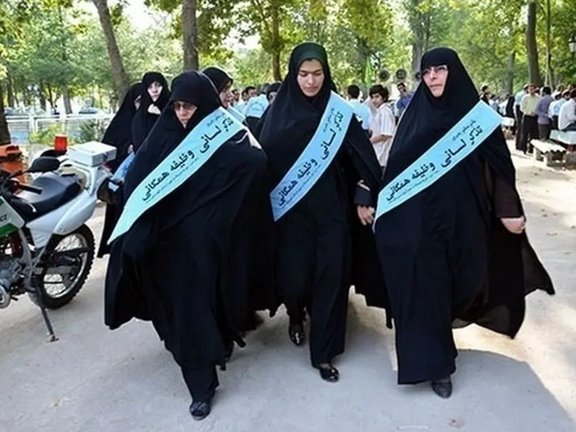
Three women have been arrested for allegedly physically assaulting a hijab enforcer in an incident in the Tehran Metro.
According to Abbas Karami-Rad, the head of the Tehran Metro Police, the incident occurred on Saturday afternoon when one woman approached three others to admonish them regarding their hijabs.
He stated that the situation escalated, leading to the three women "attacking her and physically assaulting her." Subsequently, the three women were taken into custody.
Karami-Rad explained that metro staff, who observed the altercation through surveillance cameras, promptly reported the incident to the law enforcement officer at the station, leading to the arrest of three women.
The incident has stirred negative reactions on social media, particularly in the wake of the tragic death of Armita Geravand, a 16-year-old student, who lost her life due to a violent confrontation with a hijab enforcer in the metro, and authorities deleted all traces of evidence from CCTV footage.
Amir Kalhor, a journalist, took to social media to question the circumstances of the arrests, remarking, "How did they find out? Through the cameras that have operators sitting behind them. After the Armita Geravand incident, there was no news of cameras and operators, and in some cases, the existence of cameras in the metro was denied."
Geravand was the latest victim of the repressive policies of the Islamic Republic, falling into a coma after an altercation with hijab enforcers.
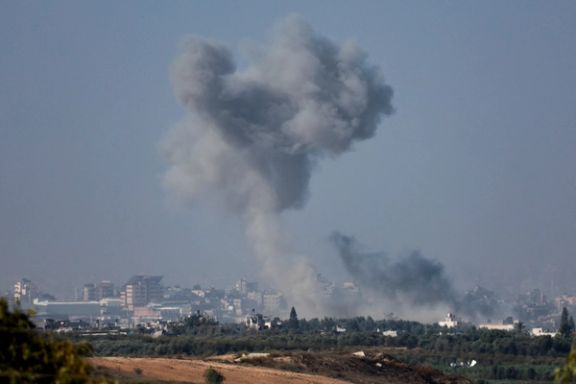
Prime Minister Benjamin Netanyahu said Israel would consider "tactical little pauses" in Gaza fighting, but again rejected a ceasefire despite international pressure.
Netanyahu said a general ceasefire would hamper his country's war effort, but pausing fighting for humanitarian reasons, an idea supported by Israel's top ally the United States, would continue to be considered based on circumstances.
"As far as tactical little pauses - an hour here, an hour there - we've had them before. I suppose we'll check the circumstances in order to enable goods, humanitarian goods to come in, or our hostages, individual hostages, to leave," Netanyahu told ABC News on Monday.
Iran’s foreign minister Hossein Amir-Abdollahian in a social media post on his personal account said that the United States has been suggesting humanitarian pauses in the fighting but accused Washington of duplicity. Tehran has been focusing its rhetoric against the United States in recent days, but so far has chosen not to get directly involved in the conflict.
However, Iran’s proxy forces in Iraq and Syria continue to target US military bases, with injuries among servicemen increasing. So far, the Biden administration has responded in kind only once, despite repeated warnings to Tehran and its militant allies.
Having encircled densely populated Gaza City in the north of the enclave, where the Hamas Islamist group is based, Israel's military said it had taken a militant compound and was set to attack fighters hiding in a warren of underground tunnels.
Israel has bombarded the enclave since the Hamas raid on southern Israel one month ago, when its fighters killed 1,400 people and seized 240 hostages.
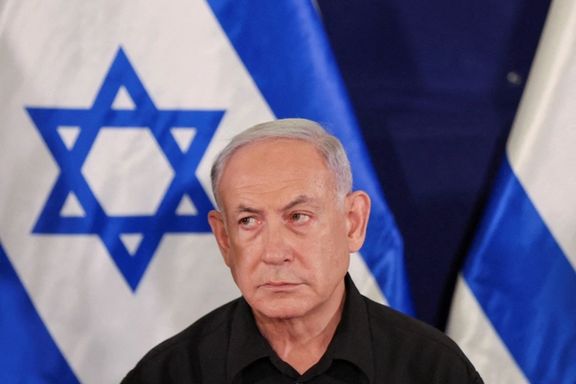
Gaza health officials say the Israeli assault has killed more than 10,000 Palestinians, including some 4,100 children, but these figures cannot be independently verified.
Both Israel and Hamas have rebuffed mounting calls for a halt in fighting. Israel says hostages should be released first. Hamas says it will not free them nor stop fighting while Gaza is under attack.
"But I don't think there's going to be a general ceasefire."
US President Joe Biden discussed such pauses and possible hostage releases in a phone call with Netanyahu on Monday, reiterating his support for Israel while emphasizing that it must protect civilians, the White House said.
Like Israel, the US fears Hamas would take advantage of a full ceasefire to regroup.
International organizations have said hospitals cannot cope with the wounded and food and clean water are running out with aid deliveries nowhere near enough.
"We need an immediate humanitarian ceasefire. It's been 30 days. Enough is enough. This must stop now," said a statement from the heads of several United Nations' bodies on Monday.
The Israeli military said on Tuesday it took control of a Hamas military stronghold in the northern Gaza Strip, where it said the forces located anti-tank missiles and launchers, weapons and various intelligence materials.
Israeli aircraft struck several Hamas militants who had barricaded themselves in a building near the al-Quds Hospital and planned to launch an attack on Israeli forces, it said.
The Israeli military on Monday released video of tanks moving through bombed-out streets and groups of troops moving on foot. It says it has surrounded Gaza City, cutting off northern parts of the narrow coastal strip from the south.
In a press briefing, chief military spokesperson Rear Admiral Daniel Hagari said troops were hunting Hamas field level commanders to weaken the militants' ability "to carry out counter attacks."
The UN Security Council met behind closed doors on Monday. The 15-member body is still trying to agree a resolution after failing four times in two weeks to act. Diplomats said a key obstacle is whether to call for a ceasefire, cessation of hostilities or humanitarian pauses to allow aid access in Gaza.
At a meeting of foreign ministers from the G7 leading democracies in Tokyo, Japan's Foreign Minister Yoko Kamikawa said the group plans to call for a pause in fighting and allowing humanitarian access to Gaza.
With reporting by Reuters
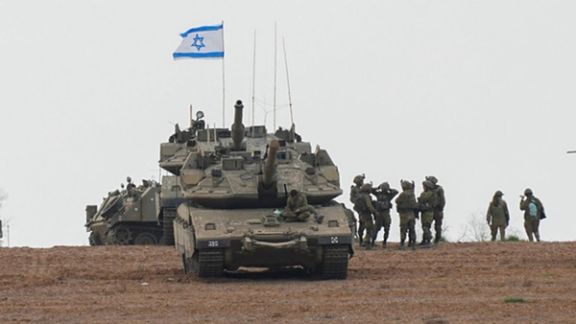
The Pentagon says at least 46 American troops have been injured in Iraq and Syria in attacks by Iranian-backed militia during the past one month.
This number is significantly higher than the last official figure (around 20), announced a fortnight ago.
Since the Hamas terror attack on Israel and the ensuing conflict a month ago, the US government has repeatedly warned Iran and its proxies against attacking American forces in the region. The figures released Monday seem to show, however, that the attackers remain unfazed.
If anything, the war seems to have widened in the last week or two.
Shiite militias in Iraq and Syria, armed groups backed, and often guided by the Islamic Republic are targeting US troops stationed in those countries almost daily.
On Monday, one of the Iraqi armed groups used the Iranian-designed Fateh-110 ballistic missile for the first time against a US base. Hezbollah is believed to have this missile too.
A month has passed since Hamas forces attacked border regions of Israel, killing at least 1,400, mostly civilians, and taking at least 200 hostage. In response, Israel has been bombarding Hamas targets in Gaza and has sent in its army into the enclave to find and destroy Hamas fighters. Hamas officials in Gaza say ten thousand have been killed, but there is no independently verified figure on casualties. At least 1.5 million people have also been displaced, according to the United Nations.
UN Secretary-General Antonio Guterres on Monday repeated his call for an “immediate humanitarian cease-fire” and a halt to the “spiral of escalation” across the region.
Speaking to reporters on the sidelines of a Security Council meeting, Guterres said international humanitarian law is clearly being violated in Gaza. “No party to an armed conflict” is above international law, he said, also demanding the unconditional release of hostages taken by Hamas on 7 October.
Israel insists it is conducting military operation based on the internationally recognized principle of self defense and is doing its utmost to only hit military targets.
The UN Security Council once more failed to agree on a resolution in its Monday meeting, with the US insisting on a ‘pause’ instead of a ‘ceasefire.’
The Biden administration has so far supported Israel unconditionally while the latter tries to “erase” Hamas from Gaza and retake control of the strip. Still, many in Washington blame the administration for having allowed the current crisis, even if inadvertently.
“For nearly 3 years they’ve flooded Iran with close to $100B,” Senator Ted Cruz posted on X. “Iran has used that money to fund terrorist groups such as Hamas and Hezbollah.”
“The Biden Administration's approach was to put Iran first,” former Secretary of State Mike Pompeo said in an interview with Fox News. “We negotiated with the Iranians on the nuclear deal; we stopped enforcing sanctions; we paid a ransom of $6 billion to get back half a dozen hostages – now the Iranians hold even more.”
Pompeo seems to be referring to hostages in Gaza, whose fate is widely believed to be in the hands of the regime in Iran, which holds considerable sway over Hamas.
The Islamic Republic is evidently reluctant to engage in direct war with Israel or the US, despite non-stop rhetoric.
“This is their entire strategy,” Jonathan Schanzer of Foundation for Defense of Democracies said on CNN referring to the regime in Iran. “They are fighting Israel to the last Palestinian, to the last Lebanese, to the last Syrian and to the last Iraqi. They use proxy groups to their advantage so that they can sit safely back in Tehran and watch with delight. "
Reports emerged Monday that the Biden administration has sent strong messages to Iran and Hezbollah via Turkey that the US will intervene immediately if they attack Israel.
Nonetheless, Iranian officials are maintaining their belligerent and threatening tone.
"What has the US done to the region that its Secretary of State, Blinken, arrived in Baghdad with a bulletproof vest,” asked Iran’s Foreign Ministry spokesman Monday.
Secretary of State Antony Blinken, on a tour of the Middle last, visited Iraq briefly, perhaps to try and push the Iraqi government to rein in armed militias who target American bases in the country.
The ones with meaningful influence over Iraqi militias, however, sit not in Baghdad but in Tehran, who seem to remain unperturbed.
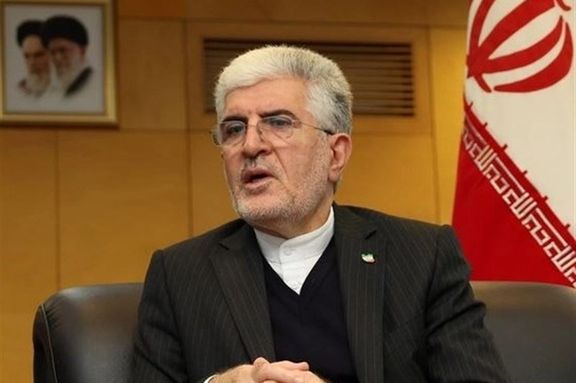
Iran's ambassador in Seoul revealed on Monday that the conversion of its funds, released by South Korea earlier this year, resulted in a 15% loss.
Ambassador Saeed Koozechi told local media that Iran’s financial loss “should be somehow compensated for.” He clarified his remark by adding, "We can compensate for these damages by strengthening and expanding the existing cooperation and capacities between Iran and South Korea."
South Korea had frozen between $6-7 billion of Iran’s revenues from oil sales that occurred before the United States imposed full sanctions on Tehran in May 2019. After four years of Iranian demands to free the funds, the United States agreed in August to allow South Korea to unblock the funds in exchange for the release of five US citizens held hostage by Tehran.
However, the money had already been converted into Korean currency, won, and when it was converted back to euros, Iran sustained losses. In the four years since the money had been frozen, won lost more than 10 percent of its value against the US dollar and the euro. The final amount that reached Qatar, the current custodian of the funds, it totaled 5.73 billion euros.
The US-Iran agreement to free the hostages in exchange for the funds led to criticism of the Biden administration, as many called the scheme the largest ransom payment in history.